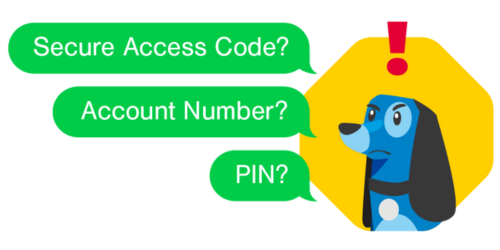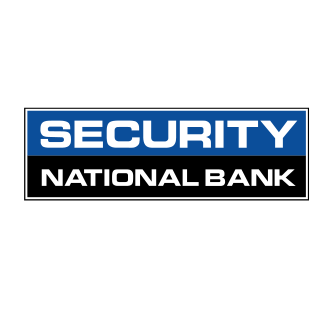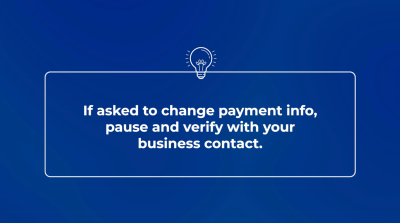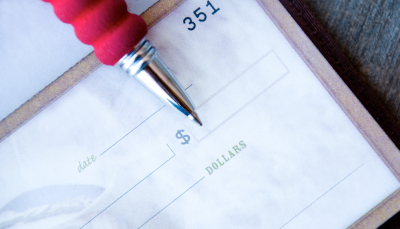Spot The Scam - Email Scams
Read MoreFraud Education
As the landscape becomes increasingly digital, safeguarding yourself and/or a business from fraud becomes more and more challenging as fraudsters continue to become more stealthy. Take a look at the resources below to help you understand the magnitude of ways fraudsters can sneak into your life and how to spot the red flags. Educating yourself is your best defense!
Banks Never Ask That
There are certain things that banks NEVER ask. Don’t fall for fake. Take action to protect your hard-earned cash against scams.

What Banks Never Ask
To verify your account number, PIN, secure access code (SAC) or password via call, text, or email.
To click a suspicious link via email or text.
Email, Phone, and Text Scam Tips
Legitimate organizations never ask for sensitive or personal information via call, text, or email. Always stop and think before making any rash decisions. Learn more about how to protect yourself with helpful resources from the American Bankers Association.
Stay Alert of Fraudulent Communications
If you ever receive a phone call, text or email that appears to be from your bank asking for sensitive information, even if the contact information looks correct, please don’t give out your personal details. If you ever receive suspicious communication, contact us right away:
Call our Customer Care Center toll-free at (855) 614-4061
Contact your designated banker
Visit your nearby branch
With the evolution of Artificial Intelligence (AI), some scammers have become more disguised to the point where they can make any phone number or email address appear to be coming from a reputable organization or individual. Our bankers are trained to verify you, but they will never contact you requesting this information:
Login ID / Password
Secure Access Code (SAC) – usually a six-digit number sent via text, email or phone
PIN
Account Number
Social Security number
Additionally, we will never request money
If you’re ever asked for your personal details—especially when coming from an unexpected call, text or email—don’t give away your information, and contact us immediately. Trust your instincts and follow the rule of thumb: Don't share sensitive data via call, text or email.
 Scams to Watch Out For
Scams to Watch Out For
Fraudsters wear many hats and use many different methods to manipulate you. Scams can be intertwined, meaning a fraudster could scam you using multiple methods—so what's your best defense against it? It's educating yourself on the many tactics used and always being skeptical.
Imposter Scams
Imposter scams often begin with a call, text message or email. Increasingly, scammers are impersonating well-known retailers such as Amazon and Apple. The scams may vary, but they work the same way—a scammer pretends to be someone you trust, often a government agent, family member, a well-known company or someone who promises to fix your computer—to convince you to send them money or share personal information. Learn more!
Romance Scams
Sharing is not always caring—protect yourself from "Romance Scams." "Romance Scams" are one of the most common forms of financial fraud and can be the hardest to recognize. The fraudster often asks for a favor or needs help to get them through a tough time. Please do not give out your account information, and do not send or accept money from someone you've met online. If asked to do so, please contact a banker at your branch and ask for help. We can help determine if it's part of a scam: 844-SNB-1964.
COMMON RED FLAGS:
- The friendship or relationship escalated very quickly.
- You've only talked to this person via phone, text or email.
- Face-to-face meetings are postponed or not possible due to extreme distance.
- They don't always ask you for your money! A fraudster may ask you to accept money on their behalf and withdraw cash or transfer it.
- When they ask for money or a favor, it is always an emergency or includes a sad story to 'tug at your heartstrings.'
Fraudsters are good at what they do! Don't let your guard down. Contact us if you are experiencing any of these scenarios: 844-SNB-1964
EDUCATIONAL RESOURCES:
Fake Check Scams
Fake checks are among the most common scams to commit fraud against consumers. Before you deposit a check you weren’t expecting or wire funds to an unknown recipient, learn more about what you should know.
Refund & Recovery Scams
Refund & recovery scams are the worst of the worst. They target people who have already lost money to a scam. If you’ve been scammed, you may be targeted by a refund or recovery scam. In these scams, someone says they can help get your money back or recover the prize or item you never got, but you need to pay them first. If you do, you’ll lose more money. Learn more!
Money Mule Scams
If someone sends you money and asks you to send it to someone else, STOP. You could be what some people call a money mule - someone scammers use to transfer and launder stolen money. Learn more!
Employment Scams
Scammers are targeting job seekers with offers that seem too good to be true. From "overpaid" checks asking for refunds to requests to run transactions through your personal account, these red flags can cost you big. Hear from our experts on how to spot the signs, protect your funds, and take action if you suspect employment fraud.
Tech Support Scams
Tech support scammers will try to sell you useless services, steal your credit card number, or get access to your computer to install malware, which could then let them see everything on your computer (including your account passwords). Learn more!
Gift Card Scams
Buying a gift card to pay someone? Stop, it may be a scam. Learn more!
Additional Scams
Fraud Detection & Prevention Tools
It's always the right time to protect yourself or your business from fraud. Fraud in its many forms can, at best, wreak havoc in our lives through major inconvenience and annoyance. At worst, it can lead to financial ruin and potentially threaten your reputation and personal safety. We've got your back with fraud tools and tips for you or your business!
Personal Visa® Debit & Credit Card Management
The Card Controls feature within the online banking platform and mobile app lets you manage your Security National Bank Visa® debit and credit cards. Start by tapping "Card Controls," and you'll see how easy it is to manage your cards. You can instantly turn your cards off and on!
Business Visa® Debit & Credit Card Management
With the CardValet app, you can instantly control your SNB Business Visa® debit or credit card features from your mobile device. This includes fraud protection (turn your card "off" or "on"), spending control (set limits and locations used), and balance and transaction review.
Check Positive Pay1 For Business
Help protect your business with Positive Pay, our fraud detection program that ensures only checks written and authorized by your business are paid. Contact our treasury management team to learn more.
ACH Fraud Filter1 For Business
Our filter can protect your accounts from unwanted transactions by monitoring incoming ACH items against pre-defined rules. We notify you promptly if an unauthorized ACH item is posted to your account. Contact our treasury management team to learn more.
Personal or Business Account Alerts
Our alerts are a robust offering that works within both the online banking platform and mobile app. You can choose to receive alerts instantly via email, text2, voice or push notifications.
Additional Resources
The following resources are from trusted sources and contain helpful information about how scams are perpetrated and tips to avoid them.
Tips for Safe Banking Online
As we live in a digital age, customers use online banking more often. Safe banking online involves making good choices—decisions that will help you avoid costly surprises or even scams.
Identity Theft
Is someone using your personal or financial information to make purchases, get benefits, file taxes, or commit fraud? That's identity theft.
For proactive inquiries or immediate help resolving identity theft, please call us at 844-SNB-1964 (844-762-1964). We will connect you with an experienced fraud specialist who will provide personal assistance throughout the resolution process.
Educational resources:
Fraud & Security Education Blog
How We Protect Your Information
Read MoreeStatements
Read MoreCheck Positive Pay For Your Business
Read More

If Fraud Strikes, Our Financial Crimes Unit Has Your Back
Our Financial Crimes Unit provides expertise in fraud prevention, detection and resolution. Committed to providing our communities with fraud education, they are passionate about knowledge sharing to help prevent fraud from even happening. And if fraud ever intrudes into the lives of our customers, they stand by as advocates. With a collective array of certifications, they're equipped to conduct thorough investigations into all forms of fraud.






